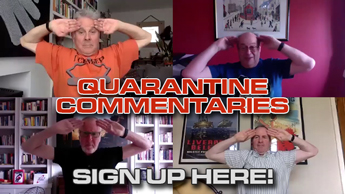 |
Nicey Does It Yes, you may well shake in your boots. Mr Flibble certainly would have, if he wore boots. The celebrity penguin tip-toes into the room to meet the man who is 'Nicey' Ackerman - Graham McTavish. |

Andrew Ellard
Mr Flibble recalled his early career - the long nights, the hard graft, the endless supply of fish. What was your first professional job?
The first professional job after I got my equity card was this horror movie called LIFE FORCE, which was originally called Space Vampires - which I think is a much better title! (Laughs) That was with an American director called Tobe Hooper, who made The Texas Chainsaw Massacre.
It was a mad experience. It was all done at Elstree, and it was all night shooting. We were supposed to be these guys who'd been infected by this terrible vampire thing where you sucked life force out of somebody. So rather than biting them, you snogged them! There was this naked woman, who was completely gorgeous, called Matilda May. She was utterly beautiful, and she spent the entire time walking around naked.
What did the film require you to do?
We were drafted in to do all this weird movement. It was all around the time of Michael Jackson's Thriller, so it was the vogue! We spent months rehearsing the movement with this choreographer, and he'd video it every day and send it to Tobe Hooper. We came to shoot it, and on the first day we had a big crowd scene. Nobody had bothered to tell the extras that a) They were supposed to be caught, and b) That we were going to be doing this really weird movement. So on 'Action', all they did was just run - and we were loping along behind them in this ridiculous fashion! (Laughs) So we just ran after them - and that was the end of the movement! Three months of rehearsal, and when it came to the actual shooting we just had to run!
What was Hooper like?
Mad. Yes, he was mad. But I saw the film and - if you approach it tongue in cheek - it's good. Frank Finlay's in it and he just camps it up. He knew exactly how to do with that part.
Mr Flibble has very fond memories of his time doing Alan Bennett monologues. Do you enjoy doing comedy?
I don't get cast in a lot of comedy. I did the movie [of] Erik the Viking and that was pretty comic. I've done theatre comedy, but not nearly as much as I've done heavy drama. I tend to get nasty people, tragic people, things like that - so I managed to be this nasty (and tragic) figure in Red Dwarf.
How did you get into working with Erik the Viking director TERRY JONES...
I met Terry, believe it or not, when I was president of the English society at university. He came and did a talk, and we discovered a shared interest in beer. (Laughs) We just bonded over beer. I think, at the time, he was writing Erik the Viking, and he said, 'You must be in this, you're perfect Viking material'. So that's how that happened. Terry is kind of a child, in the nicest possible way, just in terms of enthusiasm for the things that he does. And it's infectious. It's a very creative atmosphere.
We went on to do Wind in the Willows, and unfortunately I was doing Richard III at the time, so I wasn't able to do the part in it I was supposed to do. Which was a shame, because it was a wonderful film to work on. I just got to play this pissed weasel... which was fun. (Laughs) I got to be hit over the head by Nicol Williamson - by accident, I have to say. He dropped a barrier thing on my head. Fortunately I was wearing a very big wig...
The unreal nature of those films is very 'pantomimic' - is that a STYLE you enjoy?
I do, actually! Especially on film, because I don't think you get that kind of thing very often. A lot of film acting, you're always told, has got to be very still and minimal, and everything is in the eyes. All that's kind of true, to an extent, but when you get the opportunity to do something BIG on screen - I did a pilot for a TV series called Merlin, playing this outrageous villain in it - when the director says to do whatever you want, it's so rare.
How did you find following in Mr Flibble's flipper-steps, coming as a fresh face to RED DWARF?
On set the atmosphere was very free, which was great. I was fortunate in one way because I didn't really know the show, which meant that I wasn't intimidated by it. So I came to it very much as, 'I'm an actor on this show and so are you, so let's work together', and [the cast] absolutely did that. It was very welcoming, very supportive. Craig and Chris would come up with ideas, and we didn't have time to do them all there were so many.

Do you enjoy the villainous nature of Ackerman?
It's just great fun. Because, especially with somebody like Ackerman, their brains are wired up in unusual ways, it allows you to behave outrageously. Those kind of people don't conform to the normal rules of behaviour or normality. (Laughs) For an actor it's great fun. You don't have constrictions with somebody like that.
Do you have any thoughts on Ackerman's background?
I imagine it's quite tortured and sad. I think he probably had quite a sad childhood. The way he treats people [shows] he's not a man who's at peace with himself. He probably takes his truncheon to bed with him - in a nice way. In a nice, supportive, warm way. Not anything dirty.
This larger than life style that Ackerman has - where does that come from?
I know that, on the first day, the first thing we had to do was my big 'welcome' speech to floor 13. I had an idea of what I wanted to do with it, which was to make it extreme. You know those prison movies, it's always the psychopathic guard who greets the prisoners at the gates. I just took that and pushed it a bit further - because it's a comedy. So there is that edge between making him a genuinely frightening person and making him funny. Doug and Ed were very keen to keep pushing it.

He's awfully camp, too...
Oh, very! His outrageous little skip when he runs up stairs. He's just a troubled man who needs love, like we all do, and he gets his pleasures where he can. Like beating up Cat.
Despite your time in theatre, most of your scenes were pre-recorded, so there were only a couple of times where you went before the LIVE AUDIENCE...
It actually worked out that the last stuff I did was for the audience. Which, in a way, was the best way round. If I'd done it first, I'd have wanted to do more and more of it. The fact that it came at the end was just a really nice end to the show.
I'd never done television [before an audience] before, and it's an extraordinary atmosphere. They're so pumped up by the time you get out there. Everybody's waiting backstage to do their scenes, and its this great dressing room atmosphere of everybody going, 'Come on, yes, come on! Get out there and do it!' And when you get back in they've been watching it on the monitor, and they'll go, 'That bit went really well.' It's lovely.
Did you watch the broadcast?
Oh indeed, yes. I know a few people who have never watched themselves on television. I don't look forward to it, but I watch it critically. It's very hard for anybody to look at themselves, but I do watch it. I resist - sometimes I wait until it's gone out and then watch it on video. We watched Krytie TV live - we all got together at a big party - which was very strange, but great.
Mr Flibble recalled an entire sequence featuring him and Chris Barrie was cut because Chris felt he was being acted off the screen. Were there any Ackerman scenes cut out?
The one that I remember, that we never even got to record because we ran out of time, was this idea of Ackerman and the science officer's wife being discovered in flagrante in their Batman outfits. You remember the scene where everybody is frozen in time? Well, the idea was that [the Dwarfers] would discover them just about to do something outrageous in these outfits. (Laughs) I'm sorry that didn't happen.
You recently appearing in THE STRETCH with Leslie Grantham and former Dwarfer Anita Dobson. How was working with two actors who are so in synch?
That chemistry they have really works. It's really good. They were very welcoming, made you feel like part of the gang. I had be the complete opposite of somebody like Ackerman in that, I had to give very little away - it was important in terms of the plot that the audience didn't know where I was coming from. A lot of it was looks and stillness, enigmatic acting. That was interesting - an exercise in restraint.
What do you have coming up?
I've been playing Caliban in The Tempest, covered in scabs and dirt. Next year there are plans to do a second series of The Stretch; and a play called Fool for Love is being planned as well, I'm going to be doing that.
Mr Flibble enjoyed talking to Graham McTabvish, and now that it's over... Mr Flibble is very cross.














